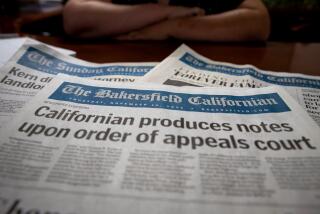Supreme Court turns down NYT reporter’s plea for confidentiality
- Share via
Reporting from Washington — The Supreme Court turned down a plea for protection from a New York Times reporter Monday, maintaining its stand that the 1st Amendment’s guarantee of freedom of the press does not shield a journalist from being required to testify about his confidential sources.
Without comment, the justices refused to hear an appeal from James Risen, a Pulitzer Prize-winning reporter who was ordered to testify in the pending criminal trial of a disgruntled former CIA agent.
Jeffrey Sterling, the agent, was fired in 2002 and sued the agency for racial discrimination. He was indicted in 2010 for revealing classified information, including the tale of a failed CIA plan to fool the Iranians by giving them flawed blueprints for building a nuclear weapon.
Risen had disclosed the plot in a 2006 book called “State of War,” which tells the story from the point of view of an unnamed CIA case officer. Prosecutors cited at least 35 phone calls between Sterling and Risen’s home or office in the two years prior to the book’s release.
Atty. Gen. Eric Holder approved a subpoena of Risen requiring him to testify, but Risen has been fighting it since. A federal judge in Virginia ruled that his testimony was not essential, but last year the 4th Circuit Court of Appeals disagreed and said the journalist had no legal grounds for refusing to appear.
It is not clear what will happen now. Holder said last week that he does not want to see reporters go to jail for doing their jobs. At the same time, the Justice Department has opposed Risen’s legal claim.
The court’s action Monday is the latest setback for the news media in a long and unsuccessful campaign to win federal protection for confidential sources.
All the states but Wyoming have laws or court rulings that usually shield reporters from being forced to reveal information they learned in confidence, but federal law includes no such protection.
In 1972, the high court rejected a constitutional shield for journalists in Branzburg vs. Hayes. Citizens who witness a crime can be compelled to testify about what they saw, the justices said, and the 1st Amendment does not “grant newsmen a testimonial privilege that other citizens do not enjoy.”
Last year, a Senate panel approved a bill called the Free Flow of Information Act which would create a federal shield for journalists, but it has yet to be debated before the full Senate.
More to Read
Sign up for Essential California
The most important California stories and recommendations in your inbox every morning.
You may occasionally receive promotional content from the Los Angeles Times.











